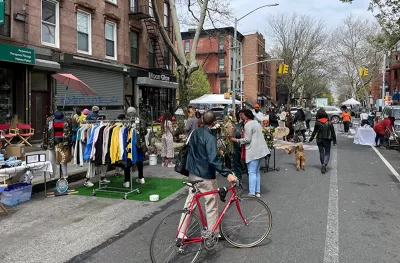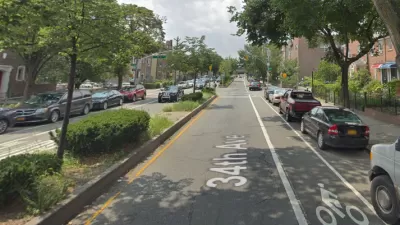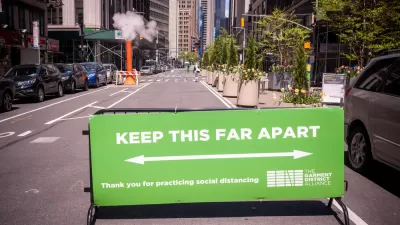As city funding runs out, the number of miles in open streets projects has dwindled from 83 to just 20.

Two high-profile New York City open streets will end or cut back their programming, potentially signaling a decline in the pandemic-era project, reports Kim Velsey in Curbed.
Park Slope’s Fifth Avenue Open Street won’t be returning this year, and Vanderbilt Avenue will cut back its season and hours. According to Velsey, this is in part because “the city left it up to local groups to pay for and run a program it has long treated as a kind of block party, and four years in, the money has run out.”
Velsey adds, “Because this has been the model, wealthy areas that could raise funds ended up having more open streets than lower-income ones, which confused public-space improvements (which benefited pretty much anyone who wasn’t trying to drive through at that particular time) with gentrification.” By the time the program was two years old, the miles of open streets in the city dropped from 83 to 20.
Advocates say the city should fund the program in the same way that other cities around the world do. According to a DOT spokesperson, the city is spending $30 million in public spaces, including its Plaza Equity Program, which supports open streets efforts but which, according to the article, has been slow to pay out participating groups.
FULL STORY: Is This the End of Open Streets?

Planetizen Federal Action Tracker
A weekly monitor of how Trump’s orders and actions are impacting planners and planning in America.

Restaurant Patios Were a Pandemic Win — Why Were They so Hard to Keep?
Social distancing requirements and changes in travel patterns prompted cities to pilot new uses for street and sidewalk space. Then it got complicated.

Maui's Vacation Rental Debate Turns Ugly
Verbal attacks, misinformation campaigns and fistfights plague a high-stakes debate to convert thousands of vacation rentals into long-term housing.

In California Battle of Housing vs. Environment, Housing Just Won
A new state law significantly limits the power of CEQA, an environmental review law that served as a powerful tool for blocking new development.

Boulder Eliminates Parking Minimums Citywide
Officials estimate the cost of building a single underground parking space at up to $100,000.

Orange County, Florida Adopts Largest US “Sprawl Repair” Code
The ‘Orange Code’ seeks to rectify decades of sprawl-inducing, car-oriented development.
Urban Design for Planners 1: Software Tools
This six-course series explores essential urban design concepts using open source software and equips planners with the tools they need to participate fully in the urban design process.
Planning for Universal Design
Learn the tools for implementing Universal Design in planning regulations.
Heyer Gruel & Associates PA
JM Goldson LLC
Custer County Colorado
City of Camden Redevelopment Agency
City of Astoria
Transportation Research & Education Center (TREC) at Portland State University
Camden Redevelopment Agency
City of Claremont
Municipality of Princeton (NJ)





























